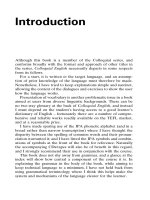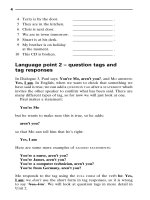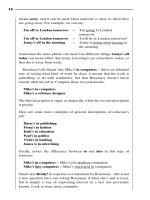e-reading course description
Bạn đang xem bản rút gọn của tài liệu. Xem và tải ngay bản đầy đủ của tài liệu tại đây (50.66 KB, 7 trang )
E-READING 3 COURSE DESCRIPTION
COURSE TITLE: e-READING 3
PRESEQUISITE: e -READING 2
MODULE VALUE: 15 modules; 1 module = 1.5 hour in-class contact
TARGET GROUP: Second year English major students.
LEVEL: Intermediate
(FCE - an intermediate level Cambridge ESOL exam, at level B2 of the Council of
Europe's Common European Framework of Reference for Languages)
COURSE CONVENER: ______________
Contact Details
Phone
E-Mail:
Assumptions
Prior to attending the course, participants are assumed to have been able to
accomplish e-Reading 2. They have acquired good insights into the variety of
task types and the specific skills required. They are also supposed to have
developed, to some extent, their strategic approaches toward comprehending
authentic reading materials and accomplishing the tasks given.
Course Description
E-Reading 3 is divided into two parts. The first part consists of six modules
and it is strategy-based. It is designed to provide participants with the general
knowledge of the six targeted reading skills and to practice the reading skills
on focus via a great many of reading exercises. The second part includes
nine modules and it is devoted to further theme- based reading practice which
aims to apply the learnt reading skills into dealing with different texts and
tasks.
E-Reading 3 is a course that consolidates and advances the participants’
skills that enable them to understand authentic reading materials, such as
extracts from articles from newspapers, magazines, journals and books of a
variety of interesting and up-to-date themes. It also aims to build up and
strengthen the learners’ reading strategies via slideshow presentations,
provision of numerous reading tips and steps to approach to different reading
formats and highly interactive reading practice. The course is to help you
READ SMARTER, NOT HARDER. The course is conducted in the light of the
principles of adult learning established UN Department of Development
Support and Management Services, Managing the development project: a
training curriculum, New York, 1993 and the humanistic approach supported
by Elias & Merriam (1980).
Principles of Adult Learning
• Learning is enhanced when the learner accepts
responsibility for the learning.
• Learning starts from the concrete experience of the
learner.
• Learning happens when everyone teaches – including
the learners.
• The most effective learning is participatory.
• The most effective teaching is a collective effort.
• This kind of adult learning strengthens the abilities of
adults to organize their learning.
• It leads to actions which, in turn, yield long-term
behavioural change.
• It exposes the learner to their own needs for new
knowledge.
• The most effective learning environment is one which
enables the learner to reflect on what is being learned
and how it should be applied.
• Effective learning links the new knowledge to the
learners’ experiences as well as to events in
contemporary times.
• Above all, adult learning has to be interesting and
enjoyable or the learners just will not learn.
(Taken from UN Department of Development Support and Management
Services, Managing the development project: a training curriculum, New York,
1993)
Course Objectives
Upon successful completion of this course, students should be able to
develop:
3.1. Communication/ creative, critical and analytical thinking
o produce effectively written sentences to reply to reading
comprehension questions derived from a variety of textual
materials using appropriate vocabulary documenting ability
to answer questions in written form
o understand main ideas and major supporting details in
textual materials
o organize data in own words to exhibit ability to comprehend
implied main ideas presented in reading selecting
o formulate written conclusions and generalizations to
represent skill at interpreting and evaluating ideas implied
and stated in a variety of textual patterns, complexities and
contexts
3.2. Reading/ critical and analytical thinking
o read independently to acquire information to plan and
prepare written responses to inquiries to exhibit abilities to
collaborate effectively with peers on assignments
o demonstrate comprehension to practice abilities to use
contextual strategies, notation and reference sources during
reading of a variety of textual selections
o detect state and implied meaning by drawing conclusions,
identifying cause and effect, distinguishing comparisons and
contrasts
o value reading as an active learning strategy to convey
understanding of reading skills by actively participating in
discussions, composing reactions to ideas, and marking
texts
3.3. Community/ global consciousness and responsibility
o internalize the idea of learning as life-long process that
increases knowledge and enhances personal growth by
improving study skills through use of newly learned
vocabulary and through exploration of reading interests by
independently selecting materials and engaging in
discussions regarding human issues
By the end of the course, the attendants will have developed,
consolidated and improved the targeted reading skills, and gained better
approach to reading texts and tasks.
Specifically, by the end of the course, the participants are expected to
1. further consolidate and improve the targeted reading skills that have
been developed during and prior to the course;
2. further develope a number of reading skills which are essential for
comprehending reading texts, such as:
• Surveying (recognizing the structure of a passage/ identifying
main and supporting ideas in a paragraph)
• Finding main ideas
• Scanning for specific details
• Understanding vocabulary from context clues
• Understanding vocabulary from word analysis (stems and affixes)
• Making inferences and drawing conclusions
3. widen their background knowledge in various subject areas
4. develop and apply appropriate strategies in completing different reading
task types
5. develop and apply appropriate strategies in completing different reading
task types
Course Content
Module
s
Strategies/Themes
1 Skill 1: Surveying
(recognizing the structure of a passage/ identifying main and
supporting ideas in a paragraph)
2 Skill 2: Finding main ideas
3 Skill 3: Scanning/ Reading for specific details
4 Skill 4: Understanding Vocabulary from Context Clues
5 Skill 5: Understanding Vocabulary from Word Analysis ( Stems and
Affixes)
6 Skill 6: Making Inferences and Drawing Conclusions
7 Theme 1: Travelling
8 Theme 2: Job and Careers
9 Theme 3: Relationship
10 Theme 4: Money, Money, Money
11 Theme 5: Famous People
12 Theme 6: Entertainment
13 Theme 7: Fashion
14 Theme 8: The Cost of Education
15 Theme 9: Good Luck and Bad Luck
Recommended Resources
1. Anderson, N. J. (2003). Active Skills for Reading. Heinle
2. Aspinall, P. & Hashemi, L. (1998). CAE Practice Test 1. Hanoi: Thanh Nien
Publishing House.
3. Aspinall, P. & Hashemi, L. (1998). CAE Practice Test 3. Hanoi: Thanh Nien
Publishing House.
4. Beaumont, J. (2006). North Star Building Skills for the TOEFL iBT. Pearson
Education
5. Bemmel, E., & Tucker, J. How to Prepare for IELTS: Hawthorn Institute of
Education.
6. Bemmel, E., & Tucker, J. IELTS to Success: Preparation Tips and Practice
Tests: Hawthorn Institute of Education.
7. Brook-hart, G. (2004). Cambridge Instant IELTS: Ready-to-use Tasks and
Activities. HCMC: HCMC Publisher.
8. Broukal, M. (2002). TOEFL Reading Flash. Lawrenceville: Peterson’s.
9. Cameron, P. (1999). Prepare for IELTS: The IELTS Preparation Course.
Sydney: UTS.
10. Carr, J. C. & Eales, F. (1998). New Cutting Edge Upper Intermediate with Key.
Edinburgh: Longman.
11. FCE Practice Tests at
12. Gallagher, N. (2001). Delta’s Key to the TOEFL Test. Delta Systems
13. Gammidge, M. (2004). Speaking Extra. Cambridge: Cambridge University
Press.
14. Gear, J & Robert, J. (1998). Cambridge Preparation For The TOEFL Test.
Cambridge: CUP
15. Hadfield, J. Intermediate Vocabulary Games. Edinburgh: Longman.
16. Hai, T. (2004). Focus on Academic Skills for IELTS: Transportation Publisher.
17. Harrison, M. & Kerr, R. (1997). First Certificate Practice Tests. Oxford: OUP.
18. Hoang, H. A. et al. (2005). Reading 1. Hanoi: VNU Publishing House.
19. IELTS Help Now. 2006, from www.ieltshelpnow.com
20. Inside Out E-lessons at
21. Jakeman, V. & McDowell, C. (1996). Cambridge IELTS 1 with Answers.
Cambridge: Cambridge University Press.
22. Jakeman, V. & McDowell. C. (2002). IELTS Practice Tests Plus. Ho Chi Minh
City: Ho Chi Minh Publishing House.
23. Jakeman, V., & McDowell, C. (2002). IELTS Practice Tests Plus: Youth
Publisher.
24. Jakeman, V., & McDowell, C. (2004). Cambridge Step Up to IELTS _ Self -
Study Student's Book. HCMC: HCMC Publisher.
25. Jakeman, V., & McDowell, C. The Cambridge IELTS Course: Insight into
IELTS. Cambridge: Cambridge Examination Publishing.
26. McCarter, & Ash. IELTS Reading Tests. HCMC: HCMC Publisher.
27. McCarthy, M. & O’Dell, F. (1998). English Vocabulary in Use. Cambridge:
CUP.
28. Mosback. G & Mosback, V. (2001). Practical Faster Reading. Cambridge:
CUP
29. Nguyen Hue Chi (2006). The Collection.
30. Nguyen Thi Vuong, Hoang Xuan Hoa, Nguyen Bach Thao, & Phan Hoang
Yen. (2004). Reading 2 for The Third & The Forth Semesters- The Second
Year.
31. O’neill, R; Duckworth. M & Gude, K. (2004). New Success at First Certificate.
Hai Phong: Hai Phong Publishing House.
32. Paran, A. (1998). First Certificate Gold Practice Exams with Key. Cambridge:
Cambridge University Press.
33. Paulson, T. (2002). IELTS Secrets: MO Media.
34. Practice Now. (1996). University of South Australia.
35. Roger, B. (1999). TOEFL Practice Test. Lawrenceville: Peterson’s
36. Roger, B. (2002). TOEFL CBT Success. Lawrenceville: Peterson’s.
37. Rogers, B. (2001). TOEFL CBT Success. Lawrenceville: Peterson’s.
38. Sahanaya, W. Lindeck, J & Stewart, R. (2003). IELTS Preparation & Practice
– Reading and Writing – Academic Writing. Da nang: Da Nang Publishing
House.
39. Slater, S., Millen, D., & Tyrie, P. (2003). IELTS on Track: Test Practice
Academic. HCMC: HCMC Publisher.
40. Sullivan, P.N; Brenner, G.A & Zhong. G.Y.Q. (2001). Master TOEFL CBT. Ho
Chi Minh City: Youth Publishing House.
41. Test Preparation Kit Workbook. (2002 – 2003) An Official Guide From ETS.
42. UCLES. Cambridge IELTS 1. HCMC: HCMC Publisher.
43. UCLES. Cambridge IELTS 2. HCMC: HCMC Publisher.
44. UCLES. Cambridge IELTS 3. HCMC: HCMC Publisher.
45. UCLES. Cambridge IELTS 4. HCMC: HCMC Publisher.
46. Unknown author. (2001). Cambridge Practice Tests for First Certificate 3 with
Answers. Cambridge: Cambridge University Press
47. Unknown author. (2006). Cambridge IELTS 5 with Answers. Cambridge:
Cambridge University Press
48. Wellman, G. (?). Wordbuilder. The Heinemann.
49. Wikipedia The Free Encyclopedia at









